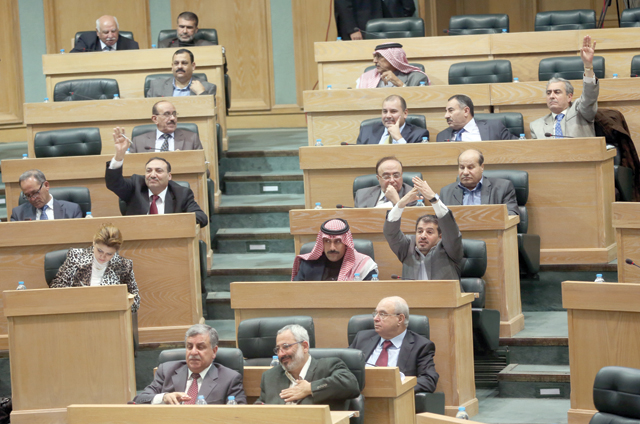AMMAN — The Lower House on Wednesday did not agree with a Senate decision to scrap an article in the draft amendments to the State Security Court (SSC) Law that excludes “resistance actions” against Israel from the court’s jurisdiction.
By insisting on their previous decision to add the said article, deputies chose not to follow the recommendations of the House’s Legal Committee, which called for approving the senators’ version of the bill.
The decision was taken during Wednesday’s session following an extensive debate over the issue.
MPs had decided to exclude “resistance actions” from the SSC’s jurisdiction following a proposal by Deputy Tareq Khoury (Zarqa, 1st District), but senators argued that the SSC Law is not the right legislation to include such a provision.
They called on the government to submit a draft anti-terrorism law to specify the crimes that fall under the category of terrorism.
“I am against the Senate’s decision and support the MPs’ point of view,” former House speaker Abdul Karim Dughmi (Mafraq, 1st District) said during Wednesday session.
“The Arab nation has regressed since the decision was taken to limit the conflict only between Israel and the Palestinians,” Dughmi added.
MP Rula Hroub (Stronger Jordan list) and several other deputies backed his view, with the majority of those present voting to retain the Lower House version of the law.
The draft law will now be forwarded to the Senate and if the senators insist on their version of the bill, the two Houses of Parliament will meet in a joint session to reach an agreement.
The amended SSC Law limits the jurisdiction of the court to five crimes specified in the Constitution: treason, espionage, terrorism, drugs and money counterfeiting.
His Majesty King Abdullah had directed the government to change the law governing the SSC to ensure that trials are in conformity with the Constitution.
Under Article 101 of the Constitution: “No civilian may be tried in a criminal case where all its judges are not civilian, the exception to that are the crimes of treason, espionage, terrorism, the crimes of drugs and currency forgery.”
The government’s changes to the SSC Law ensure that civilians indicted on state security charges, other than those listed in the said constitutional article, are tried before a court whose judges are all civilians and one that is affiliated with the Judicial Council rather than the SSC.
